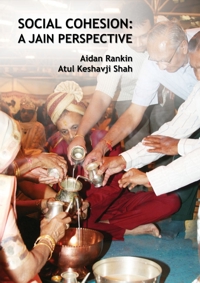There was once a group of blind men who approached an elephant in the forest. One of them touched the animal’s ears and perceived a flat, fan-like creature. Another man touched the leg and found a thick, round post and yet another finds the tail and thinks the elephant is like a long, hairy rope. Finally the owner of the elephant said to them: “All of you are correct, but you are also wrong because each of you has touched only one side of the elephant. Each of you is right from your individual standpoint, but the truth is something different altogether.”
This is the Jain version of a well-known folk tale, of Indian origin, which is told in many ways by people of many faiths. Hindus, Sufi Muslims, Sikhs and Humanists all recite their own versions of ‘the story of the blind men and the elephant’. For the Jains, the story itself - and the fact that there are many ways of telling it - illustrates the principle known as Anekant, which means Many-Sidedness or Multiple Viewpoints. For the idea that there are many paths towards the ultimate truth is central to the faith tradition of the Jains.
Over thousands of years, Jains have survived - and flourished - as a perpetual minority. Rather than forcing their ideas on others, they have preferred to exert a more subtle influence. They do not seek ‘converts’. However they welcome anyone who seeks to live as non-violently as possible and to live in a sustainable way, reducing consumption in the interests of the planet as a whole. Mahatma Gandhi, for instance, was deeply influenced by Jainism although he remained a devout Hindu. The impact of Jain principles on his thinking shifted the emphasis of his Hindu philosophy. They helped him to place non-violence at the centre of his thinking, and to focus on social justice and the emancipation of women as integral parts of the anti-colonial movement rather than mere add-ons. Gandhi’s non-violent Satyagraha or ‘truth struggle’ influenced Rev. Martin Luther King’s civil rights movement among African-Americans, which has inspired many subsequent campaigns for peace and social justice.
For the Jains, non-violence is more than merely a form of outward behaviour. It is the principle that governs all mental processes, because violent thoughts lead logically to violent speech and deeds. Jain practice involves training the mind to avoid hateful thoughts. Being a Jain therefore means listening to other opinions and ideas, in order to enrich one’s own.
One of the most important features of Jainism is its strong sense of community. Individual freedom, enterprise and initiative are all highly valued, and in the spiritual arena everyone is considered to be his or her own guru. Yet individuality and self-realisation are aided and enhanced by co-operation with others, rather than sterile competition as an end in itself. In India and everywhere they have settled, Jains are noted for their business success. They are equally drawn to the public and legal sectors, and to caring professions including medicine, teaching and social work.
In Jain thinking, there is no division between the two ‘worlds’ of commerce and public service. Their relationship is one of mutual support, for one cannot effectively exist without the other. Jains have a strong tradition of social entrepreneurship. Also, all Jains revere the ascetic who has renounced possessions, and this makes them put their wealth, power or good works in perspective, avoiding arrogance or self-righteousness. The ethics of Jainism stress the importance of the family, the equality of men and women, reverence and care for the old, love and nurturing of the young. Social solidarity is viewed in inclusive terms, encompassing the whole of society, not merely the Jain community. This is because Jainism is founded on a belief in cultural diversity the equally important search for shared values and truths beneath apparent differences.
Another aspect of Jainism has radical implications: the idea that social solidarity extends to the whole of the natural world. ‘Community’ is defined as the community of living beings, rather than humans alone. This reminds us that we are part of a much larger natural process, and that all the earth’s ecosystems are interconnected. Attempts to ‘conquer’ or ‘dominate’ the natural world are symptoms of misguided human arrogance - of which life-threatening pollution and climate change are logical outcomes. True knowledge means understanding that we are part of that natural world and so we must learn to co-operate with the rest of nature as well as our fellow men and women. Animal welfare has always been critically important to Jains, as has a larger ecological consciousness: the sense that humans must be constantly aware of the nature’s delicate balance and limit their activities accordingly. It could be argued that the idea of humankind’s ‘ecological footprint’ originated with the Jains.
Jainism is a very ancient faith, but over millennia it has proved itself rational, scientific and adaptable. There are three main ways in which it is profoundly relevant to the problems, and possibilities, associated with social cohesion in modern Britain:
- Jain ecological awareness mirrors our green concerns. It can help us, individually and collectively, make changes in our lives and priorities. It also reminds us that the environment is not an ‘issue’ that can be compartmentalised and dealt with separately. Instead, it affects our whole approach to economics, politics, the way society is organised and the choices we make in our own lives. Until we broaden the concept of social, we shall not be able to cohere effectively.
- Jainism’s strong sense of community and emphasis on co-operation can help us heal the wounds and divisions that have ravaged our society, despite - or perhaps as a by-product of - our prosperity. There is a rising awareness that the cult of self-fulfilment through consumerism has failed us, creating fragmentation and discontent, contributing to family and community breakdown as well as environmental damage. There is also a growing sense that we have over-emphasised personal gain, instant gratification and competition. Inevitably, this has been at the expense of our relationships with each other, for example relationships between family members, friends, neighbours and work colleagues. The breakdown in social relationships runs parallel to our disconnectedness from the rest of nature. It has produced a culture of self-centredness, which finds ultimate expression in violence. Community breakdown also contributes to low-level anti-social behaviour, neglect of children, the old and the mentally ill, and a climate in which extreme inequality of income and poor quality of life is tolerated.
Politicians and policy-makers are increasingly concerned about these aspects of contemporary society. They are looking for practical solutions, a more coherent framework of values to hold families and communities together. Jainism can provide both - not in a strident, partisan or confrontational way, which exacerbates tension, but by showing that strong principle is compatible with tolerance, and that strong family and community ties are compatible with personal freedom. It is a question of both/and rather than either/or.
Jains in Britain are a small but thriving community. They have been able to preserve their own culture, traditions and beliefs, and at the same time fully participate and integrate in modern Britain. This success in both integration and conserving their culture is the product of many generations of experience. A perpetual minority in India, they escaped absorption into the larger Hindu community, whilst maintaining friendly relations and cultural exchanges with Hindus. Jains have also enjoyed positive relations with Muslims, Sikhs and Christians. One of India’s Mughal rulers, Akbar, was persuaded by a Jain monk to renounce hunting and release captive birds. Jain communities have lived harmoniously with people of all faiths and none in all the countries to which they have emigrated. They have long experience of living in multi-cultural societies, and adapting to the challenges they present - experience which they can share with others, perhaps other minority communities in particular.
In today’s multi-faith Britain, faith itself has become a potent political and social force. To a large extent, it has been a force for good, countering the trends towards fragmentation and selfishness, promoting community solidarity, encouraging co-operation and self-help. Yet there is also a powerful threat of religious extremism, which at its worst gives rise to violence and terrorism. The causes of religious extremism are many and complex. They include the isolation of communities from each other, continuing racism, unemployment and social exclusion, the conflict between conservative forms of religion and an apparently ‘permissive’ society.
Religious extremism is often fuelled by events and struggles abroad, which reinforce a sense of alienation from mainstream society. As well as directly threatening lives, it threatens community relations, playing into the hands of racists. Indeed religious extremists and racists represent two sides of the same coin. Both thrive amid social deprivation and both are equally opposed to integration and good relations between faiths. But we must remember that those who are influenced by extremist propaganda are themselves victims, even when they are inspired to plan and commit outrages.
Extremists - of whatever religion or ideology - thrive on ignorance and distrust between communities that have ceased to interact. With its doctrine and practice of Multiple Viewpoints, Jainism has an in-built inoculation against extremism. For a Jain, the more dogmatic the expression of certainty, the further it must be from the truth. Jain practice keeps in mind the idea that we are all travelling from different directions towards the same truth, which because of our human limitations we are unlikely to reach in one lifetime. Understanding of each other’s journeys is viewed as a spiritual as well as a social good, and so Jains practised ‘inter-faith dialogue’ centuries before the phrase was invented. - Jain teachings of reconciliation and understanding between faiths can give a spiritual underpinning to the struggle against extremism - which is defined in Jain terms as Ekant, or One-Sidedness. Jain ideas, and the contributions of individual Jains, provide a positive alternative for policy makers to the cruder (yet sadly more conventional) approach of ‘either you are with us or against us’. This is inherently limiting and has too often inspired repressive measures and reinforced the grievances of extremists, both imagined and real. The gentle but persuasive philosophy of the Jains cuts through the adversarial structures and ways of thinking that constrain us, personally and politically. Without having to ‘become’ Jains, we can learn to be more like the owner of the elephant in the folk tale. We can realise that the truth is not our narrow certainties, but ‘something different altogether’.
Such understanding points us towards forms of social cohesion appropriate to a multi-cultural, multi-faith society. With that in mind, we explore in this paper issues of cohesion from a Jain standpoint. The ideas we present are our own, but they derive from or are inspired by the Jain tradition. We believe that this tradition, and the way of thinking that goes with it, has much to offer to the wider society.
 Aidan Rankin
Aidan Rankin
 Dr. Atul Keshavji Shah
Dr. Atul Keshavji Shah
